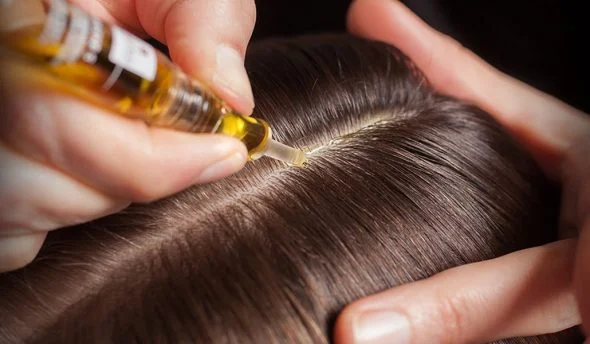7 Natural Ways to Prevent Hair Loss
Hair loss is often thought of as a male problem, but it can happen to anyone. There are many potential causes for hair loss, some of which resolve on their own.
Others are genetic and can only be slowed, not stopped. But many people experiencing unusual hair loss can benefit from a simple lifestyle change.
It’s important to head to your doctor for an official diagnosis, but each of the following 7 natural ways to prevent hair loss is low-risk and generally free of side effects
1. Use the gentlest products and treatments
Regular hair dyeing and constant heat treatments really do a number on hair and can lead to hair loss. If you are experiencing this problem, the first step is to switch to a gentle shampoo and conditioner that won’t strip moisture from your scalp.
After cleansing, air dry your hair and don’t use a curling or flattening iron.
If you really can’t skip the dye, look into switching to organic hair dyes that don’t have ammonia, peroxide, or para-phenylenediamine (PPD) among their ingredients.
In the meantime, avoid tight ponytails or braids that put too much pressure on the hair roots.
2. Tweak Your Diet
To slow or stop hair loss related to a nutritional deficiency, explore a diet high in greens and herbs, such as the Mediterranean diet.
This will boost your intake of vitamin A, which can accelerate the rate of hair growth and improve sebum production, keeping the scalp healthier.
Because your hair follicles are mostly constructed of a protein called keratin, eating more of it also helps with hair loss.
At least one 2017 study supported this idea when it found that people with hair loss were more likely to have a deficiency in the amino acids that serve as the building blocks of protein. Healthy sources of protein include chicken, turkey, fish, eggs, beans, nuts, and low-fat dairy products.
3. Add Some Supplements
If you struggle to get enough nutrition in your diet, consider adding a daily multivitamin to fill in the gaps.
Science has found that vitamins A, B, C, D, selenium, iron, and zinc all contribute to the process of hair growth and retention, most specifically when it comes to cell turnover.
Vitamin D, in particular, is thought to be connected to non-scarring alopecia, so an additional supplement that delivers 800 to 1000 IU of vitamin D daily could help if that is your diagnosis.
Other supplements that have been linked to improvements in hair loss are ginseng, which has important phytochemicals that promote hair growth and saw palmetto, which slows hair loss in men by helping to maintain testosterone levels as they age.
4. Use Essential Oils
One, in particular, found that massaging cedarwood oil combined with lavender and rosemary into the scalps of participants resulted in less hair loss for 43% of them. Other essential oils that are promising for alopecia patients include lemongrass and peppermint.
Experts recommend mixing a couple of drops of essential oil into two tablespoons of carrier oil such as jojoba, coconut, olive, or grapeseed.
You can use any combination of the recommended essential oils that you prefer. Each day, massage the oil into your scalp and leave it for ten minutes before washing.
5. Reduce Stress with Exercise
Stress is actually a huge contributor to hair loss that is not caused by a diagnosable disorder.
There are lots of ways to reduce stress in your life, but exercise is a great one because it has so many other benefits beyond better hair.
And not only does exercise reduce stress, but it also improves blood flow all over the body, allowing your hair follicles better access to the nutrients they need to work properly.
Yoga is an excellent low-impact exercise that both provides physical benefits and allows you to center and calm your stressed-out mind.
6. Get a Massage
Scalp massage is another great way to reduce stress and stimulate blood flow. We aren’t sure exactly why it works, but studies have shown that regular massage helps people with hair loss to see an improvement. The key is to do it regularly, even daily if possible.
But don’t worry – it doesn’t take much to see the effects. Studies have shown that just four minutes of massage per day over at least 24 weeks can do the trick. That can easily be done in the shower while washing your hair but is also effective at any time of the day.
7. Try a Trendy Treatment
You may hope to avoid taking a medication like Minoxidil (Rogaine) or Finasteride (Propecia), but that doesn’t mean you can’t rely on medical science to prevent hair loss naturally.
One popular treatment is laser therapy, where low-level lasers are used to stimulate epidermal stem cells. This is thought to improve hair density.
This treatment, also called red light therapy, can even be done at home with your own laser device. Though they are typically priced in the range of $200-$600, you’ll still save significant money over visiting your aesthetician as it takes many treatments to see a difference.
There are lots of things that can cause hair loss beyond male pattern baldness, including thyroid problems, scalp infections, stress, androgenic alopecia, post-pregnancy hormonal shifts, and the normal aging process.
Each cause can be treated in some way, though not all can be completely prevented.
Thankfully, undertaking natural treatments centered on nutrition, exercise, and gentle hair care is actually very effective.
Though it can take six months or more to really see the difference, starting on a hair preservation regimen now is worth the time and effort.
It’s always easier to maintain and improve what you’ve got rather than work back up from a major loss.
Name
Health



